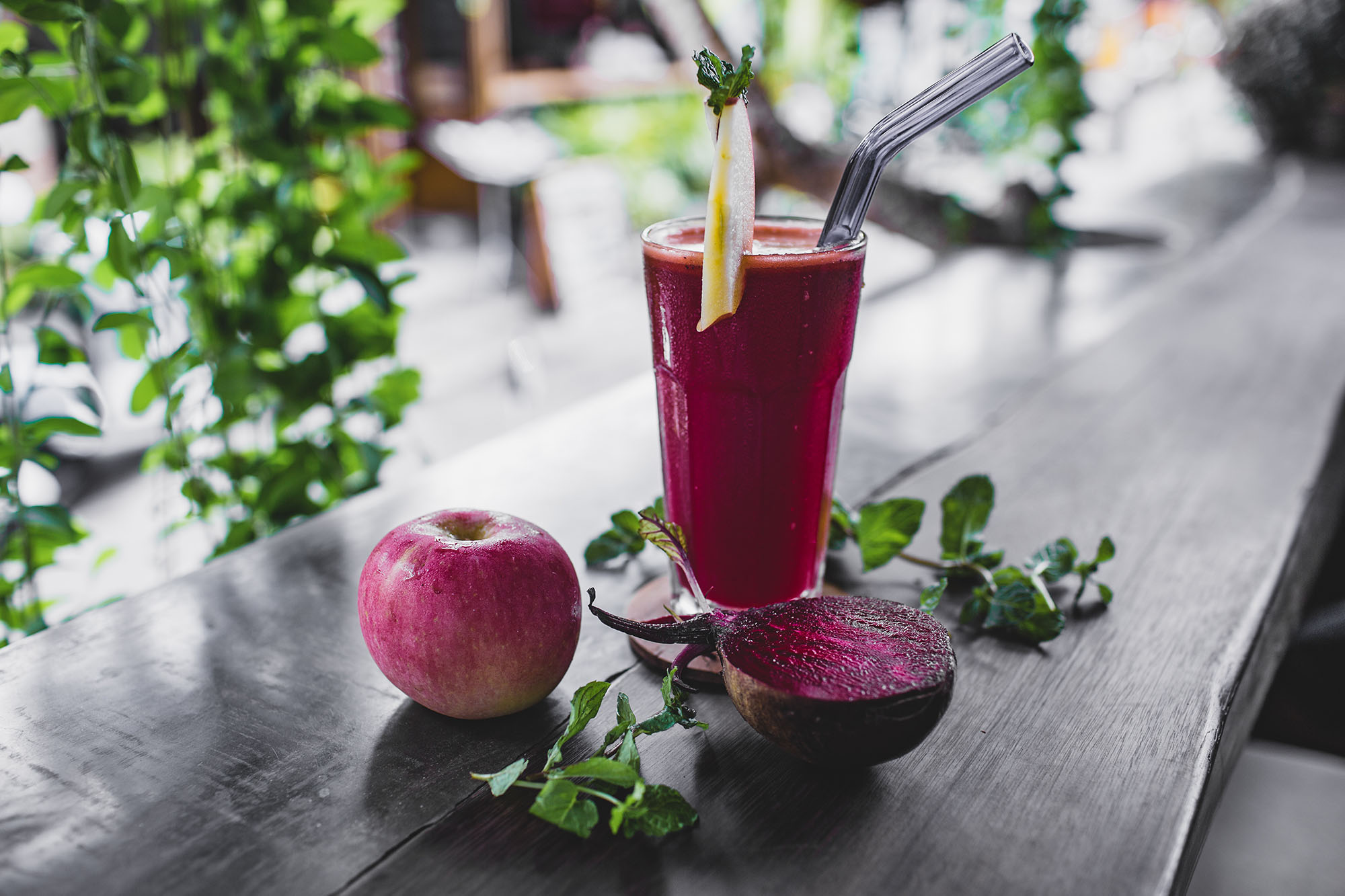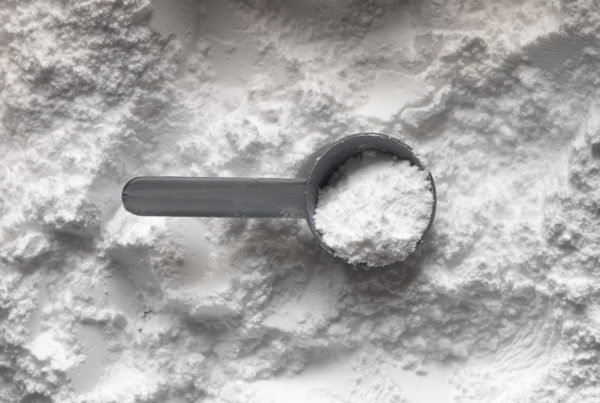Beetroot is a bulbous, sweet vegetable that is not only a colorful addition to our lunch plate. It turns out that regular consumption brings many benefits, especially in sports such as MMA, running, cycling, volleyball, and football, extending the duration of the training and providing more energy. But not only that – beetroot juice should be drunk by all of us! What makes this vegetable so special? What are the advantages of regular beetroot juice consumption? How often can we drink it? Read this article and find out.
Beetroot juice nutritional benefits
Beetroot juice contains a whole range of nutrients such as betaine, fiber, vitamin C, potassium, manganese, and iron. Some of them support the nervous system, others are responsible for proper digestion and immunity. Its rich nutritional profile and low caloric content (44 kcal/100 g) bring a number of health benefits and will be a great supplement to everyone’s diet.
Additionally, beetroots contain nitrates, nitrites, and inorganic pigments which, by dilating the blood vessels, have an influence on, among others, better blood supply and improve sports performance.
Beetroots are also a good source of potassium (9% of the RDI), which is involved in the proper functioning of nerves and muscles. Too low potassium levels can cause fatigue, weakness, muscle cramps, and heart problems.
Prevent neural tube defects such as spina bifida and anencephaly thanks to the content of folic acids (20% of the RDI), which are B vitamins. It can also reduce the risk of having a premature baby. Women planning pregnancy should think about beetroot juice supplementation.
Beetroot juice in sports
Its beneficial effect in sports is caused mainly by the presence of nitrates and nitrites. It is from them that nitric oxide synthase (NOS) is formed which dilates blood vessels and thus improving performance during training [1].
NOS activity is dependent on the availability of oxygen. During intensive training (for example sprint) the accessibility of oxygen is too low, then the formation of nitric oxide may be limited [2]. Beetroot juice comes in handy, enabling the production of nitric oxide in conditions of low oxygen reachability. In simple words – drinking beetroot juice shortly before or during intense training has a positive effect on increasing training efficiency.
The above-mentioned nitric oxide also improves the efficiency of mitochondria (the place where energy is produced from ATP). This means that by drinking beetroot juice, muscles may use up to 4% less energy to do the same work [3]. Thanks to this, you will be able to work longer and keep energy until the last moments of training.
It may also affect calcium transfer proteins and ATPase activity, which directly affects the strength of muscle contraction [4]. It also affects the consumption and regeneration of phosphates (including phosphocreatine and ATP) during muscle contraction. In addition, nitric oxide is involved in the activation of satellite cells, so it can potentially also affect regeneration between training units.
In the study, the athletes drank beetroot juice at 500 ml/day (5.6 mmol of nitrate) for six days. In the last 3 days, they had to do a series of knee straightening on the machine to the maximum. As it turned out, the beetroot juice group was able to work 25% longer [5].
In 2011, cyclists who, after consuming 500 ml of beetroot juice, covered the distance of 4 and 16 km were examined. In the beetroot group, compared to the placebo group, the generated power significantly increased and the travel time was shortened (by 2.8% per 4 km and 2.7% per 16.1 km). In subsequent studies, it was proved that supplementation with beetroot juice among cyclists 3 hours before training improves the effectiveness of training and increases oxygen consumption by up to 20% [6].
Supplementing with beetroot juice will work best for efforts of 5 to 40 minutes (for example, during short-distance runs or team sports). You can expect smaller effects during workouts lasting more than 40 minutes [7]. This can be explained very simply – after all, you are not running a half-marathon or a marathon in a sprint. For this reason, the risk that your muscles run out of oxygen is reduced. Additionally, in endurance sports, type 2 (slow twitch) muscle fibers are mainly used for work, and nitric oxide works better for type 1 (fast twitch) muscle fibers.
It helps in maintaining normal blood pressure
As mentioned above, nitrates dilate blood vessels, helping to keep blood pressure at the correct level. Too high may be a risk factor for many heart diseases such as heart attacks, strokes, and heart failure.
In one study, volunteers had their blood pressure measured before consuming beetroot juice (500 ml) and 3 hours after. It has been shown that beetroot can lower blood pressure by as much as 4-10 mmHg [8].
In another study, 15 women and 15 men were given 500 ml of beetroot juice. The pressure was measured before and for 24 hours after supplementation (every hour). The diastolic blood pressure dropped by 4-5 mmH after about 6 hours [9].
Potential properties of beetroot juice
There are other potential benefits to consuming beetroot juice. However, further research is required to confirm them:
- through the content of nitrates, it can help in the fight against dementia [10]
- thanks to the content of antioxidants, it can prevent cancer [11]
- thanks to the flavonoids it contains, it can reduce cholesterol [12]
- thanks to the betaine content, it can reduce inflammation in the body [13]
Is it safe to drink beetroot juice everyday?
While reading my article, you are probably wondering what dose will be right for you and can you consume it everyday? It depends on our individual preferences and tolerance. Unfortunately, beetroot is one of the products rich in FODMAP, which means it can cause gastro-intestinal problems. If you notice these symptoms, reduce the frequency or dose of your consumption.
The most common recommendation is to drink 500 ml of beetroot juice 2-3 hours before exercising. It turns out, however, that chronic supplementation 3-15 days before exercise will also be helpful [7].
In what other form can I consume beetroot juice?
Drinking beetroot juice frequently can be uncomfortable. Thanks to the pigment called betaine, it is highly staining and can leave discoloration on the skin or clothes. Supplements available on the market in the form of powders, tablets or shots come to the rescue. It is a more practical form, and a properly selected product will be an ideal replacement for natural beetrootroot
(especially among people with gastrointestinal problems).
Beetroot juice in powder form is a natural product made from dried, ground beetroot. Just dissolve it in water or add it to a smoothie to quickly and easily deliver it with your daily diet. It will be a great alternative for busy people.
For those who do not like the taste of beetroot, supplementation with tablets or shots with extracts of this vegetable is perfect. Sometimes supplementation with 500 ml of beetroot juice may turn out to be insufficient and it is necessary to double the dose. To minimize the risk of gastrointestinal problems, I recommend this form of supplementation.
Remember, that not all supplements will work equally effectively. 24 products for sports were tested, only 5 of them provided a portion of> 5 mmol of nitrates [14]. Before buying, make sure that the product is tested and worthy of attention.
Summarizing
Undeniably, supplementation with beetroot juice brings many advantages. Rich in nutrients, it affects many health aspects of our body. Each of us should include it in the diet.
In particular, brings advantages in sports, mostly in the case of team sports or short but intense training (e.g. sprints or MMA). Numerous studies have shown that the nitrates and nitrites contained in beetroot increase training efficiency and reduce energy expenditure, thanks to which the effectiveness of training increases.
Since beetroot increases blood supply to the heart and dilates blood vessels, its regular consumption is also recommended for people struggling with hypertension or with a genetically increased risk of heart disease.
However, remember to choose the amount of beetroot juice you consume wisely. Too high doses may cause gastrointestinal problems (especially among people sensitive to products with a high FODMAP content). In this case, it is worth considering supplementation in the form of powders, tablets, or sheets.
References:
- Totzeck M., Hendgen-Cotta UB., Rammos C.: Higher endogenous nitrite levels are associated with superior exercise capacity in highly trained athletes. Nitric Oxide 2012, 15:75 – 81.
- Lundberg JO., Weitzberg E., Gladwin MT.: The nitrate-nitrite-nitric oxide pathway in physiology and therapeutics. Nat Rev Drug Discov 2008, 7:156 – 167.
- Larsen FJ., Weitzberg E., Lundberg JO. i wsp.: Effects of dietary nitrate on oxygen cost during exercise. Acta Physiol (Oxf) 2007, 191:59 – 66.
- Burke L, Deakin V. Clinical Sports Nutrition (3rd Edition). Australia: McGraw–Hill; 2006
- Bailey SJ.,Fulford J., Vanhatalo A. i wsp.: Dietary nitrate supplementation enhances muscle contractile efficiency during knee-extensor exercise in humans. J Appl Physiol (1985) 2010, 109:135 – 14
- David J Muggeridge, Christopher C F Howe, Owen Spendiff, Charles Pedlar, Philip E James, Chris Easton A single dose of beetroot juice enhances cycling performance in simulated altitude Med Sci Sports Exerc 2014 Jan;46(1):143-50.
- Jones AM.: Dietary nitrate supplementation and exercise performance Sports Med 2014, 44:35 – 45.
- Andrew J Webb, Nakul Patel, Stavros Loukogeorgakis, Mike Okorie Acute blood pressure lowering, vasoprotective, and antiplatelet properties of dietary nitrate via bioconversion to nitrite Hypertension. 2008 Mar;51(3):784-90
- Leah T Coles, Peter M Clifton A single dose of beetroot juice enhances cycling performance in simulated altitude Nutr J 2012 Dec 11;11:106. doi: 10.1186/1475-2891-11-106
- Tennille D. Presley, Ashley R. Morgan, Erika Bechtold Acute effect of a high nitrate diet on brain perfusion in older adults Nitric Oxide. 2011 Jan 1; 24(1): 34–42.
- Fernando Gandía-Herrero, Josefa Escribano, Francisco García-Carmona Biological Activities of Plant Pigments Betalains Crit Rev Food Sci Nutr 2016;56(6):937-45. doi: 10.1080/10408398.2012.740103.
- Mohammed Al-dosari1, Saleh Alqasoumi effect of beta vulgaris l. on cholesterol rich diet-induced hypercholesterolemia in rats FARMACIA, 2011, Vol. 59, 5
- S Asgary, M R Afshani, A Sahebkar ,Improvement of hypertension, endothelial function and systemic inflammation following short-term supplementation with red beet (Beta vulgaris L.) juice: a randomized crossover pilot study Hum Hypertens. 2016 Oct;30(10):627-32.
- Gallardo EJ, Coggan AR. What’s in Your Beet Juice? Nitrate and Nitrite Content of Beet Juice Products Marketed to Athletes. Int J Sport Nutr Exerc Metab. 2019;29(4):345–349.







